AWS Vs. Microsoft: 7 Things To Watch As The JEDI Cloud Saga Unfolds
A federal judge granted Amazon Web Services’ request for a temporary restraining order that will prevent Microsoft from moving forward with implementation work on the JEDI cloud initiative.

JEDI: The Next Episode
The JEDI cloud saga for all intents and purposes got started at the Sheraton Pentagon City hotel, just over the hill from Arlington National Cemetery, in March of 2018.
At that Industry Day for the Joint Enterprise Defense Infrastructure initiative, dozens of tech companies came eager to learn more of the military’s plans to procure comprehensive Infrastructure-as-a-Service and Platform-as-a-Service capabilities from a commercial cloud provider.
But the cloud strategy revealed that day, and elaborated on later in two draft RFPs, surprised many by taking what was viewed as a distinctly non-multi-cloud approach. The military’s decision for a single cloud provider to win the bulk of the JEDI contract became the spark that set off high-pitched skirmishes across the tech world that ultimately redounded back to the halls of power in Washington D.C.
Now, as Microsoft prepares to begin implementing a multi-billion-dollar cloud transformation for the U.S. military, AWS is pulling out all the stops to hit the brakes and force a new process to re-evaluate submissions.
In a last-ditch lawsuit challenging the final selection of Microsoft as a decision corrupted by bias and pressure directly from the president of the United States, AWS seeks to depose President Donald Trump as well as the former and current Secretaries of Defense.
Amazon’s legal team won some breathing room Thursday when the judge granted its motion filed last month seeking a temporary restraining order to stop JEDI work that was set to begin this week.
All the briefs have been filed, and now those anticipated rulings loom large over the military, the tech industry and even the White House.

A Presidential Deposition
AWS has served a notice seeking the depositions of President Donald Trump, former Defense Secretary James Mattis, Defense Secretary Mark Esper, DoD CIO Dana Deasy, and three people on the source selection committee for JEDI.
With Trump in particular, Amazon can point to a very clear and extensive public record of the president making statements regarding the JEDI procurement and expressing animosity against Amazon and its CEO, Jeff Bezos.
But the request to depose Trump is uniquely without legal precedent, as no judge has before weighed whether to compel a sitting president to answer questions in a matter of federal procurement. The only case law Judge Patricia E Campbell-Smith can fall back on comes from the Paula Jones lawsuit against Bill Clinton, which did lead to a presidential deposition after a Supreme Court ruling that a president is not immune from civil litigation.
“AWS acknowledges that there are sensitivities with deposing President Trump,” the company’s lawyers wrote in their legal motion.
Considering neither Congress nor a special counsel could get the president to sit down and answer questions in person, it seems Amazon has an uphill battle in bringing Trump to the deposition table.

85 Days
JEDI had seen so many delays stemming from internal reviews and legal challenges by the summer of 2019, that military leaders were warning if a provider wasn’t selected and implementation didn’t begin soon, they would have to start assembling other piecemeal cloud solutions.
In June, DoD CIO Dana Deasy said the military cannot wait much longer to transition to public cloud, warning that “who suffers in all this is the warfighter.”
But in August, just as the date set for a vendor announcement was approaching, newly appointed Defense Secretary Mark Esper launched another review at the insistence of the president.
"Keeping his promise to Members of Congress and the American public, Secretary Esper is looking at the Joint Enterprise Defense Infrastructure (JEDI) program. No decision will be made on the program until he has completed his examination," a Defense Department spokesperson said at the time.
That review further set back JEDI by 85 days, during which Esper unexpectedly recused himself from the evaluation, citing a professional relationship his son had with IBM, one of the initial JEDI bidders that had already been knocked out of contention.
Through its legal challenge, AWS is looking to discover as much as it can about what happened at the Pentagon and at 1600 Pennsylvania Avenue, and between the two, during those 85 days.

Secretary of Defense James Mattis
AWS wants to depose both former Defense Secretary James Mattis and current Secretary Mark Esper.
Mattis was deeply involved in the origination of the JEDI concept, which was first announced a month after he made a tour of tech companies on the West Coast in August of 2017.
That trip had a high-profile stop in Seattle during which Mattis met at Amazon’s headquarters with Amazon CEO Jeff Bezos—a meeting that has been extensively highlighted as improper by Oracle in its legal challenge to JEDI. Oracle has focused on a then-advisor to Mattis who previous to that work owned a national security consultancy that had AWS as a client.
But it’s been reported that it was actually a sit-down with Google founder Sergey Brin during that trip that really sold Mattis on the wisdom of adopting a commercial cloud provider to gain for the military a significant technological advantage in front-line operations.
AWS has pointed to a book written by Mattis’ former speechwriter, retired Navy Cmdr. Guy Snodgrass, who said he heard Trump tell Mattis to “screw Amazon” out of the JEDI contract. Its lawyers now want to ask Mattis about such communications with the president he served.

Secretary of Defense Mark Esper
Mark Esper, a former Aerospace lobbyist who Trump nominated for Secretary of the Army in 2017, was promoted to Secretary of Defense in the thick of JEDI combat.
Despite the urgency of military leaders to begin implementing a cloud solution, on his first week on the job Esper ordered the review that delayed JEDI another 85 days.
Esper said he wanted the Pentagon to “take a hard look” at the contract after complaints had come his way from the White House and members of Congress.
Still puzzling to JEDI-watchers is Esper’s decision to recuse himself from the procurement on October 22—three days before Microsoft was announced as the JEDI winner. Esper cited his son’s previous employment with IBM, one of the initial JEDI bidders that had long been eliminated from contention.
Amazon contends it has evidence that recusal came after the decision was already made to select Microsoft (though not yet announced), which makes it even stranger.
Amazon wants to learn more through a deposition about conversations Esper had with any members of the Trump team around JEDI, and public-facing information he was aware of that played a role in the 85-day review, his subsequent recusal, and the ultimate source-selection decision.

Microsoft Pushback
When AWS challenged the final decision to select Microsoft as the military’s commercial cloud provider in court, the Defense Department agreed to stall substantial implementation work—but only until Feb. 11.
Microsoft is rearing to begin a massive migration of military workloads to its Azure cloud, and in countering Amazon’s attempt to pause the project has intervened in the case as a co-defendant of the government.
In a motion Microsoft recently filed seeking to dismiss the case, the company’s lawyers argued none of Trump’s public statements about Amazon were directly relevant to JEDI, and there’s no evidence that they influenced procurement officers.
Microsoft has accused Amazon of “sensationalist and politicized rhetoric.”
With the latest decision from Judge Campbell-Smith to grant the temporary restraining order, Microsoft will have to find more patience.

Oracle Matters
Most of the controversy around JEDI in its first year was stirred by Oracle during a period in which AWS was widely presumed the prohibitive favorite to win the contract.
The technology giant vociferously protested the contours of the JEDI RFP from even before its official introduction, arguing that overly restrictive gate criteria were drafted by conflicted Amazon insiders to deliver the contract to AWS.
Oracle lost a challenge in the GAO, then sued the federal government in the same U.S. Court of Federal Claims that Amazon now seeks redress. AWS voluntarily joined the case as a co-defendant of the government.
In addition to the legal fight, Oracle maintained an aggressive lobbying effort seeking to encourage U.S. lawmakers to intervene in the military’s cloud selection strategy and criteria, and call attention to what it argued were clear conflicts of interest military decision-makers had in favor of Amazon.
After losing its initial lawsuit, Oracle filed an appeal in November. Even though Microsoft by that point had been selected the JEDI recipient, Oracle’s appellate arguments remained laser-focused on AWS.
Oracle accused military officials with AWS ties as engaging in “corruption of a high order.”
That appeal remains pending. But it is unclear what Oracle’s strategy is at this point, and whether it’s legal or lobbying efforts might still influence a final outcome.

The Next Episode
Not that Judge Patricia E Campbell-Smith has ruled to grant Amazon a restraining order halting implementation, JEDI-watchers are next waiting to see whether the court seeks to compel the depositions of the president and defense secretaries.
If all goes Amazon’s way, and depositions further support its argument of a source-selection process marred by political interference, Campbell-Smith can ultimately decide to send the JEDI contract back to the Pentagon for a re-evaluation process across its eight selection criteria.
But it’s not at all clear how military technologists would conduct that opaque process anew to remedy the previous result in a manner satisfactory to all parties.
AWS has repeatedly said it only seeks a “fair and objective valuation” based on the criteria specified in the RFP.
But it’s hard to imagine Microsoft reacting without its own protest to any reversal of fortune.